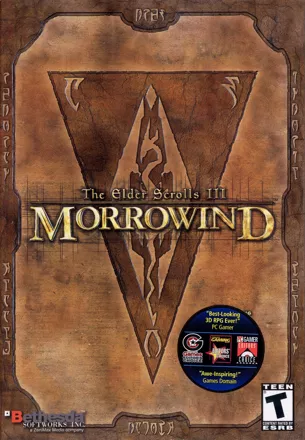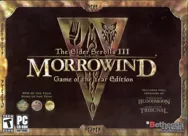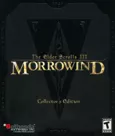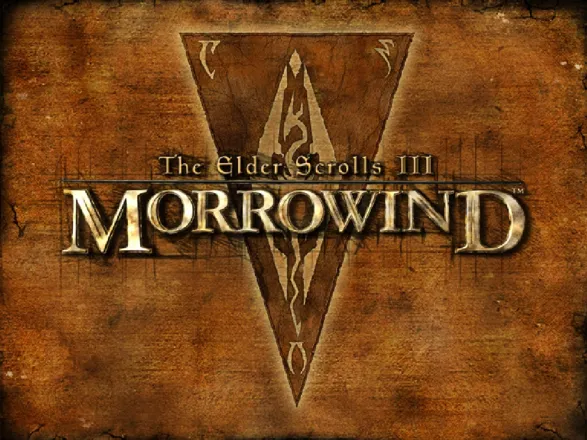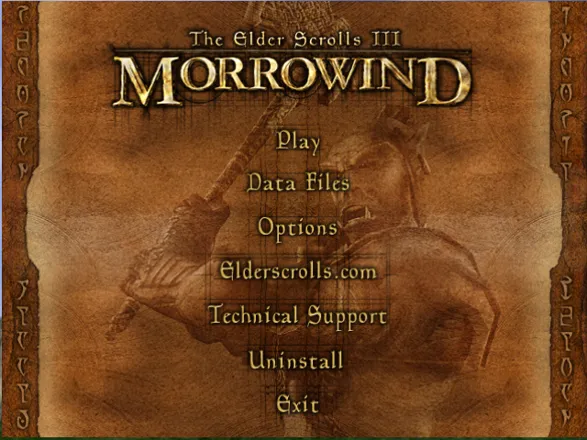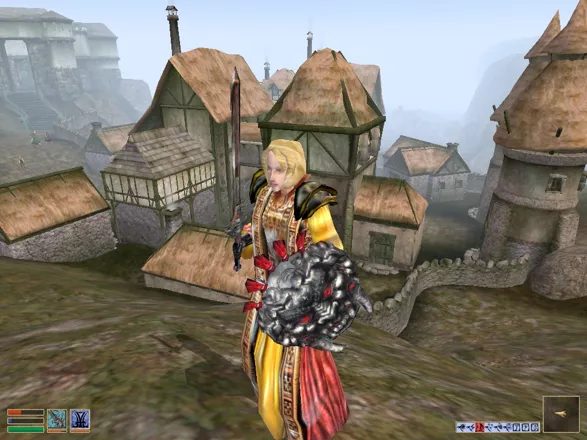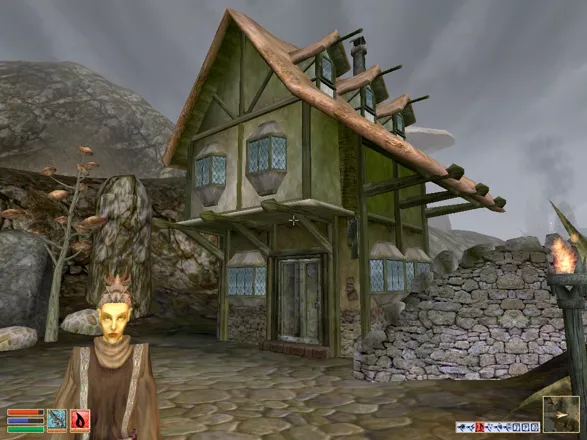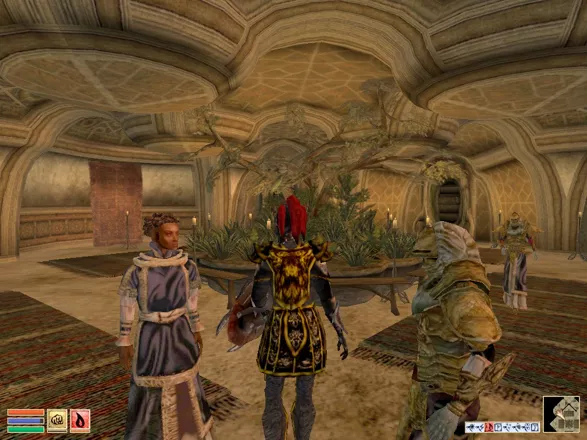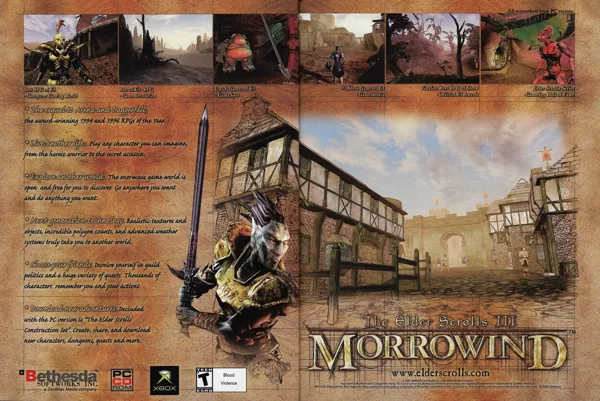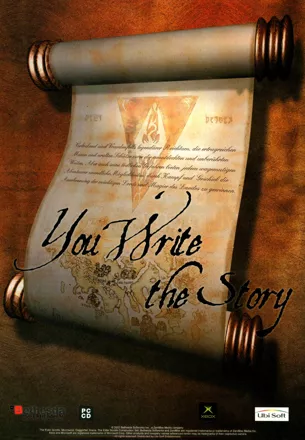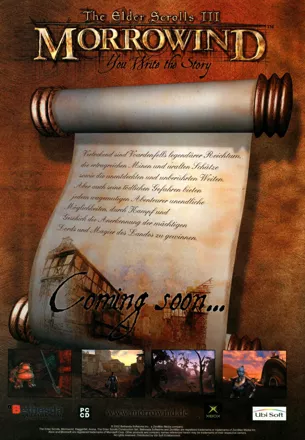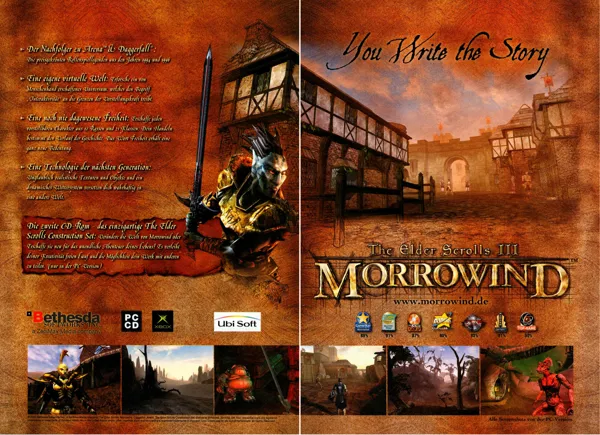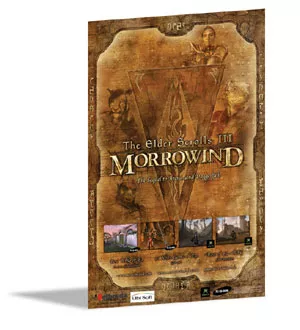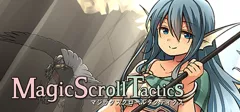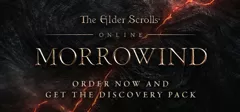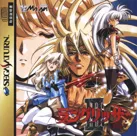The Elder Scrolls III: Morrowind
Description official descriptions
Freed by the decree of Uriel Septim VII, the Emperor of Tamriel, a lone prisoner is transported to the province of Morrowind. It seems that the strange dreams this prisoner has been having lately may have a connection to equally strange events occurring there. The protagonist is given a simple assignment: join the Blades, a secret organization whose goal is to protect the safety of the Emperor. This leads to a discovery of an ancient prophecy and an evil scheme concocted by a powerful deity whom the protagonist alone is able to stop.
Conceived in the tradition of the Elder Scrolls series, Morrowind is a fantasy role-playing game with a vast world open for exploration. After being released from a prison ship at the shores of the island Vvardenfell, the protagonist may do more or less what he or she wants: follow the main quest and solve the mystery of an ancient prophecy, join any of roughly a dozen guilds and rise in their hierarchy by performing duties, or simply explore the gigantic island with its stylistically diverse cities, hundreds of dungeons and tombs, ancient ruins and mighty fortresses.
Morrowind uses a two-stage skill system. The hero’s primary stats (strength etc.) increase with each level gained, while secondary abilities improve by use – for example, the more often the character jumps, the more proficient he or she becomes in the Acrobatics skill, etc. The action-oriented fights are simple exchanges of strikes or spells, until one combatant dies. The enemy's hit points and condition were not originally shown; however, at the request of customers a health bar was added for enemies as part of the first upgrade patch.
The protagonist's race and gender, but also his or her reputation influence the reactions of NPCs. If a character’s sympathy for the hero is low (rated on a scale from 1 to 100), he might refuse to answer questions; if it is high, the player will get more detailed information and better bargains in shops. Most quests involving other persons can be solved by persuasion, pick-pocketing, or simply by force.
The game's NDL 3D game engine is powerful in drawing wide, detailed outdoor landscapes as well as complex indoor environments. Transitions are not fluent; houses and dungeons must be loaded upon entering.
Spellings
- 上古卷轴III:晨风 - Simplified Chinese spelling
- 上古捲軸 III:魔捲晨風 - Traditional Chinese spelling
Groups +
- Animals: Cats
- Console Generation Exclusives: Xbox
- Covermount: Fullgames
- Elder Scrolls series
- Fantasy creatures: Dwarves
- Fantasy creatures: Elves
- Fantasy creatures: Orcs
- Gameplay feature: Alchemy
- Gameplay feature: Burden / Encumbrance
- Gameplay feature: Character development - Repetition
- Gameplay feature: Drowning
- Gameplay feature: Equipment quick slots
- Gameplay feature: Hunting
- Gameplay feature: Journal
- Gameplay feature: Paper doll inventory
- Middleware: Bink Video
- Middleware: Gamebryo / Lightspeed / NetImmerse
- PC Gamer Presents games
- Physical Bonus Content: World Map
- Protagonist: Female (option)
- Software Pyramide releases
- Technology: amBX
- Ubisoft eXclusive releases
- Xbox Classics releases
- Xbox Platinum Hits releases
Screenshots
Promos
Videos
Add Trailer or Gameplay Video +1 point
See any errors or missing info for this game?
You can submit a correction, contribute trivia, add to a game group, add a related site or alternate title.
Credits (Windows version)
118 People (80 developers, 38 thanks) · View all
| Project Leader | |
| Lead Designer | |
| Lead Programmer | |
| Lead XBox Programmer | |
| Lead Artist | |
| Lead Character Artist | |
| Programming | |
| Additional Programming | |
| World Art & Building | |
| [ full credits ] | |
Reviews
Critics
Average score: 89% (based on 83 ratings)
Players
Average score: 4.0 out of 5 (based on 284 ratings with 23 reviews)
Never since Ultima 7 has a game been so expansive
The Good
STORY
You are a captive, onboard a slave ship that has docked at the Island Vardenfell...off the coast of Morrowind. Having no idea what you are doing here you must start off greenlimbed and form a life for youself in this new world.
The main story also revolves around a few aging gods, plots to end the world amongst other many many sub plots...
GRAPHICS Probally some of the best I've seen for a RPG...there's so so so much detail in this game - and if you have a good graphics card to boot - well you're in for a treat!. Firstly the island is chock full of details - you are not just wandering around a blank plain with a few trees here, a rock there...no you are wandering around an incredibly varied enviroment that is filled with many sights and sounds...from giant mushrooms, to rolling hills...it's pretty much all there (save snow and forests). There are plenty different races living here and each have their own style of accomodation...Some races like the Imperials live in large impressive fortresses that dot the sky, others may live in the ancient massive city of Viviec where the tiered cantons reach into the sky...or some choose to grow their homes out of large impressive fungi. The details on these dwellings is very impressive...from the simple Tudor style house to the massive intricately twisted and spirialing plant homes the textures are just incredibly done, the same goes for objects and characters. Each character has a different face...though some faces are more commonly repeated - mainly on guards...and some races don't have many faces to choose from...which kind of spoils it a bit...also there are different hairdos for each race as well that adds to the viarity. Lighting is also well done, there's just something wonderful about seeing the sun slowly set and the stars comeout...you can even see the birth signs in the night sky. There's just so many more things graphcially that make Morrowind so wonderfully immersive...you can't really explain them all.
GAMEPLAY Ok this is very different from most other RPGS...other RPGS offer the usual - kill more things...get experience...Morrowind...does it differently...the more you use a certain weapon the more skill you get with it...after you fill around 200 experience points of whatever (be running, using a sword...etc) you gain a level...it's a bit confusing.
Acessing something is done by using space, attacking is by the right mouse button...then comes accessing the inventory.. The inventory, map and stats are all one one screen...this is really irritating because there's not much room for it all - unless you are running the game at a high resolution. It would have been better to have the map and so on a different button. Sword fighting is a bit too dull - you move in a direction and you strike in a direction - a but too limited in my opinion - and it's made even more limited by ticking the "best attack" option in the menu.
AI is pretty lax...they either attack when provoked, or just attack...no real tatics involve - just run up and whack the crap out of the offender. Also the crime system is a tad weird as well...when you loot or kill someone - you can either pay the guard, go to jail (lowers experience) or fight (making yourself an outlaw).The things to do in Morrowind is large and plentiful...you can even become a vampire - adding a twist to the game as you can only travel at night - and most people want to kill you outright.
There are many many quests that you can partake on - and some are simple, others are just weird...but all really involve just either killing someone, or retreving an object (usually by killing someone). There's alot of walking involved as well, while there is transport to and fro areas...most of the time you are on foot power...which comes to another game flaw...you walk like you have had your legs bound! It's very slow and irritating...even when you're constantly running.
The Bad
It's hard to get into. You start off with no idea what to do...or really where to go, not many people like you, and you have next to no cash...and you just got beaten up by a rat.
Also the scope of Morrowind is just massive, there's so many things to do in the game it's just crazy...and you kind of get bored in the end because you end up doing so many side quests that you never get around to the main story.
Also the Journal is just not very well done. It records many little notes and conversations in there and is a good book of reference...but...it gets too messy fast and you are constantly flipping backwards and forwards trying to find information about something...there's an index - but that does not really help as well.
Also the game is bit of a resource hog...after a while the game starts to slow - so you have to close the game to clear the memory a bit. Also the game is prone to just crashing...no warning...just click boom back to desktop...which is very annoying if you have not saved.
The Bottom Line
Morrowind does have a few weird gameplay flaws in this in comparison to the other RPGS out there...but there are so many things to do in this game world that you will rarely get bored.
Windows · by Sam Hardy (80) · 2003
The Good
Daggerfall, the predecessor of Morrowind in the Elder Scrolls series, was a very ambitious game that captured the hearts and the minds of many hardcore role-players, at the same time "scaring away" those who were overwhelmed by the size of its world and its openness. Some people felt it was too big, with too much random design, both for locations and inhabitants.
Morrowind corrects that right away by offering us what is undeniably its most valuable asset - its world. The world is the star of the game, a goal in itself; and it is quite amazing. Without doubt, it is one of the most mesmerizingly beautiful and attractive worlds ever to grace a video game.
Of course, the technical quantum leap contributed to the quality of the game's environment. The vision of Daggerfall was still slightly ahead of its graphical capacities; in Morrowind, technology caught up with imagination. No more desolate, poor sprites decorating the landscape; no more pixelation and drab textures. Morrowind is significant as one of the visually most advanced role-playing games in history; not ever since the first Ultima Underworld have we seen an RPG that challenges first-person shooters in graphical prowess. Yes, the characters could have used some more work, but both in- and outdoor areas are beyond reproach, and the water is absolutely gorgeous. I honestly can't recall another game from that time and even a few years later with such beautifully rendered water.
This world, however, becomes much more memorable thanks to its artistic side, its strong personality and sense of style. The province of Morrowind is exotic: giant mushrooms cover the lairs of strange creatures; majestic urban architecture co-exists with the native dwellings of the dark elves; twisted mountain paths, dark caves, rivers glistening under the busy sky - the world of Morrowind is a marvel, and it is worth to play this game just for its exploration.
And this exploration, like in the previous Elder Scrolls games, is absolutely unrestricted. You can go wherever you want right from the beginning. The gigantic world (yes, much smaller than in Daggerfall, but still much bigger than in most other games) is open to you, and you are free to get to know it in any order, from any side you want. It has more charisma and mysterious charm than its predecessor, and a much more logical and coherent structure. I also liked the fact that you had to physically travel to towns rather than being magically transported to them through the world map. The freedom of movement is exhilarating; it's hard to play other games after Morrowind because they feel so limited in this aspect.
The world is also meticulously detailed, with people and objects everywhere; you can talk about thousands of things and get thousands of items. There is a huge amount of quests, several large factions to join, and so many different locations that you can easily complete the game while having seen only a small fraction of what it has to offer. This kind of generosity makes role-playing particularly rewarding: you are given the freedom to be what you want to be, unbound by moral constraints (except your own) and restricted accessibility to places and quests.
I think the series' trademark system of "practicing" skills is excellent. I love this steady, focused approach to leveling up, and I love the fact that with enough patience you can get overpowered. The whole point of role-playing is to start low and then reach tremendous heights. Morrowind brilliantly conveys this feeling. You start as a nobody, with a lousy weapon and no armor, easily killed by medium-sized creatures in the wilderness. But slowly, through exploration, questing, item-gathering, and not the least practicing, you can become a mighty, feared warrior who can take on Daedric lords and other assorted creatures of darkness. This process is extremely addictive, since there is hardly any limit to what you can discover and do in this game.
The main story may be less intriguing than in Daggerfall, but it nevertheless offers some interesting missions, and is generally enveloped in an aura of mystery that fits the gameplay very well. There is little urgency in the main quest, and it differs in its format from the usual "save the world" template. This goes well with the whole idea of "making your own story", building a biography for the protagonist by yourself rather than doing exactly what the designers told you to do.
The Bad
There is less randomness in Morrowind than in Daggerfall, but repetition and artificial widening of content is still evident. Yes, the world is populated by hundreds of NPCs with whom you can discuss various topics; but after a while, you begin to notice that these characters tell you the same stuff over and over again. There are no truly memorable characters in this world; 99% of the NPCs are signposts, drones devoid of personality and useful only for obtaining quest and basic info. You can try to conduct the conversation in such a way that you avoid the incessant "job description" dialogue ("I'm a thief. Thieves steal things and then sell them for profit. We also have a Guild, with branches located in the following cities... etc."), but then you may miss out some important info and will be left with pitiful one-sentence introductions that say nothing about what kind of person the character in question is. I still can't understand why the same writers who created all those wonderful books that can be found in the game world couldn't bother to write decent conversations.
The quests improve only slightly over the "I need you to kill a person. I will pay you 1437 gold pieces" of Daggerfall. With a few exceptions, the quests involve simplistic and repetitive tasks that offer no moral decisions, hence diminishing the game's value as an RPG. There is a lot of indifference in the people of Morrowind, and I couldn't help thinking sometimes that, in the long run, it didn't really matter what I did or did not in the game. The static, dry inhabitants of Morrowind form an unpleasant contrast with its beautiful art; it is as if someone put a curse on these people, making them apathetic and nearly lethargic, with intimidatingly robotic reactions to any crime the protagonist commits, and completely oblivious of anything else around them.
All this creates a feeling of emptiness, a certain coldness and loneliness that gradually creeps out and eventually takes over. Morrowind is a fascinating trip, but one that resembles an archaeological expedition more than a visit to a functioning, normal country. One may argue that this isolation is deliberate, intending to emphasize the complete freedom by eschewing any attachments to the characters; but that is a far-fetched theory. I'm sure that it was possible to populate the game's world by interesting people without harming its image as a "create your own story" experience.
The Bottom Line
Morrowind was the game that propelled its creators to stardom, and I think its success was fully deserved. We can complain all we want about its weak side quests and lack of interesting characters, but its majestic scope, its sensual beauty, and the exhilarating freedom of its gameplay are unparalleled. Forget about story, forget about goals: let yourself melt in the gigantic, strange world, and perhaps you will see how you slowly find yourself unable to leave it.
Windows · by Unicorn Lynx (181780) · 2014
The best single player RPG I've ever seen, and probably the best for a while.
The Good
The 'good' section could go on for quite a while, so I'll try to keep it as summary-ish as possible while still detailing all the marvels of this game.
You start out as a released prisoner who's been shipped off to the island of Vvardenfell, on the far northeastern reaches of the Empire of Tamriel. Why, you don't know (and similarly you have no other knowledge of your past). You at once enter a charming little medieval village filled with great architecture and people milling around randomly. Of course, as soon as you talk to a few NPCs, the less-than-charming undercurrent of events in the town becomes evident: the local tax collector has vanished, and probably killed by the way people talk of him. The guards are corrupt. People at once offer you quests of stealing from other people. And this is before you get to cities with the assassin's and theives guilds! (There seriously is an assassin's guild, and what's more it's totally legal--a writ from the guild being literally a pardon for murder!)
Once you've gone through the preliminary steps of creating your character (which is cool because you can choose from a huge list of diverse characters, or--as I think most people did--just combine whatever skills you want into a character of your own choosing) then you can head out into the next room from the census officer and proceed to rob it of all its silver plates and lockpicks and money, if the urge strikes you. From there on you can do whatever you want. No limitations, no orders from anybody except directions to go to another city and find some guy, which you can put off forever if you like. You can explore around the gigantic island of Vvardenfell, which has impressive landscapes: the coastal areas are green with grass and mushroom shaped trees and lakes, but as you move closer to the volcano in the middle of the island it becomes a maze of paths in between rocky, blacked mountains, with buildings made from the shells of giant insects and bazillions of dungeons and tombs throughout.
There are numerous guilds and feuding factions you can join and do quests for them to gain respect and services. There is a main quest, but you can just ignore it and go explore the island, discovering every little secret plot, historical mystery, or evil shrine that is has to reveal. After a good amount of playing, my character has still only explored the western coast of the island, which leaves lots more to see, and has never run short of things to do. Many secrets await (such as being turned into a vampire, sometimes inadvertently) and little flashes of humour too (sometimes unintentional: one time I sold a huge heavy shoulder pad to a wizard in a robe, and if you sell an expensive item to anyone, they'll put it on. She put this on, and it looked hilariously funny)
Even out in the wilderness are NPCs who offer you quests: I was walking around one time and some lady asked me to direct her to a place where she was making a pilgrimage to. She knew where it was, so I don't know why she needed a guide. But she offered me 150 gold, so I obliged. Along the way, we were swimming through a lake when I noticed that her dead body was floating on the surface of the water, having been killed by a hostile sea creature. it was all the same to me--the gold was on her anyway. Etc.
The game is totally opened and it would take months or maybe years of playing to full explore the island--and there are two expansion packs as well, Bloodmoon generally being considered the better of the two.
Anyway, graphics are awesome, there's a wierd variety of creatures, that, combined with the wierd 'Ashland' terrain almost feels like you're on a desert alien planet. The architecture is extremely varied and carefully done, and every little detail is in place. You can do anything you want, almost, and lead your character down any path you like. Live as a knight, running around freeing slaves and saving lost pilgrims. Or become an outlaw, sneaking around towns and hacking up citizens for their valuables--which works fine as long as you don't get caught.
Well, Looking at how much I've written, it's probably almost enough. So on to the Bad.
The Bad
The majority of my gripes with this game are of the 'it could have been even awesomer' variety. As it is, the game is better than most, but I still find myself seeing ways it could have been better done.
A more serious problem first: The quests are often repetetive and boring, consisting of go-get-this-item (or, even worse, gather a batch of alchemical ingredients, for which you have to go rooting through every little plant in the countryside hoping to find it) or go kill such and such a person or monster. I hear the quests are a lot better in the Bloodmoon expansion, which I haven't played.
Secondly, you need an incredibly powerful computer to run the game, due to all the great graphics and huge extent of the place, and most people probably don't have the required system specs. And even with a great computer, you'll encounter frequent sandstorms in the Ashlands which drive your framerate down to horrible levels.
While there are plently of different NPCs to talk to, they seem bland and undetailed, most of them apparently having no in-game reason to exist--they don't reveal any information that other people don't, they don't offer quests, etc. And the time of day doesn't affect them in any way: they still wander around the streets, meaning it's no easier to commit a crime under the darkness than the light. The only difference is that the guards carry around torches at night.
The crime and legal system could have been a lot better. Let's give some examples: I can walk into a guard tower and find a guard standing up there, doing his job. I decide to wait until his back is turned and then grab that incredibly valuable armour sitting on the table behind him. My crime is unseen and I walk out (he doesn't notice. 'Is that an iron longsword in your pants or are you just glad to see me?') but you'd think that he'd have had a good enough look at me that when they notice the stuff is gone they'd come looking for me. Or I can go up there and kill the same guard, and beat him to death instantly, but somehow I get the message box that 'Your crime has been reported' and I have a bounty on my head--making people unwilling to talk to me, among other things. Even though the only witness is stone dead.. Could it be that someone saw me on the way out? No, because I got in trouble the second I hit the guy. Another example: I can kill a villager while nobody is looking, then sit next to the body poking at it with my sword and playing paper doll with it, putting different clothing and armour onto it, and a guard walks right past, not having any second thoughts. And nobody ever mentions that the person died, either. And finally, I can find someone wandering in the back alleys and hit them. Then they run away and out into an open area full of people and guards, and I then catch up and kill them. But the guards didn't see the beginning of the fight and don't pay any attention to it.
Enemies don't go through doors. Every location, even a cave, has a door, and if you're being overpowered, you can just walk out the door and sleep for a couple hours to regain your strength, while presumably the enemies are beating on the inside of the flimsy wooden door, unable to open it.
And your actions, ultimately do not affect the game world. You can do whatever you want, become head of any guild, or the leader of a ruling house, but you can't affect their political relations with the other houses, or send people on the same missions you fought through to get to your position.
But forget about all this. The game is still awesome.
The Bottom Line
This game is incredible. Get it now. First get all the necessary computer upgrades to run it, but still get it. And tell all your friends!
Windows · by munchner (10) · 2003
Discussion
| Subject | By | Date |
|---|---|---|
| Add Game Group | karnak1 (22) | Dec 24, 2012 |
| Morrowind vs. Oblivion | Unicorn Lynx (181780) | Jul 26, 2007 |
Trivia
1001 Video Games
The Elder Scrolls III: Morrowind appears in the book 1001 Video Games You Must Play Before You Die by General Editor Tony Mott.
Content
Morrowind is told to include 3244 NPCs, 316.042 hand placed objects, 480 billion possible characters to create and play, 150 billion spells by using spellmaking in the game, and six full sized novels worth of text.
Creature differences
Some monsters and creatures went through drastic visual changes from Daggerfall and Battlespire to Morrowind. First, the type of khajiit are the same as those presented in Redguard, while the Dremora were turned from fair-skinned, horned demons to black and red-skinned demons. Harpies were replaced with (visually at least) Winged Twilights, and other monsters such as the slaughterfish, orcs and others remain much the same, though much better looking in true 3D.
Graphics
Ever wonder why Morrowind can run at such a slow FPS sometimes and why the game is notorious for making even expensive, fast systems (as of 2004) seem slow? The answer is simple; polygons. While playing the game you'll encounter vast areas full of people, objects and architecture. All these are made from polygons and require the videocard to process them. Morrowind has possibly the heaviest counts of polygons in a single video game, most likely surpassing every game before it and still with a vast number more than contemporary games.
References
There is a single daedric crescent from Battlespire hidden in Morrowind, but getting to it requires some work and initiative (it isn't a part of any main or faction quest), or access to a hint guide.
Awards
- 4Players
- 2002 – #9 Best PC Game of the Year (Readers' Vote)
- Computer Games Magazine
- March 2003 (Issue #148) - #3 overall in the "10 Best Games of 2002" list
- Computer Gaming World
- April 2003 (Issue #225) – RPG of the Year
- GameSpy
- 2002 - PC RPG of the Year
- 2011 – #14 Top PC Game of the 2000s
- RPG Vault
- 2002 - Game of the Year
- 2002 - Role-Playing Game of the Year
Information also contributed by calavera, Jason Musgrave, ShadowStrike and WildKard
Analytics
Upgrade to MobyPro to view research rankings!
Related Sites +
-
Baldurdash
Kevin Dorner's site has bug fixes for Morrowind -
Elder Scrolls III: Morrowind
The official homepage of Elder Scrolls III: Morrowind. Contains general information, downloads, art, and plug-ins. -
Hints for Morrowind
Need just a few clues about Morrowind? These question and answer hints provide nudges before the final solutions are revealed. -
Morroblivion
A free mod that brings Morrowind into Oblivion by converting the game files. -
Morrowind Summit
A Morrowind fan site containing vast amounts of information about the land of Morrowind and how to create your own Morrowind adventures. -
Morrowind at RPGDot
Contains news, information, and downloads for Elder Scrolls III: Morrowind. -
Telesphoros' List o' Mods
One man's opinion of the ESSENTIAL fan-made enhancements (mods) to the Morrowind world. -
The Elder Scrolls III: Morrowind - FAQs & Guides
A multitude of walkthroughs, faqs, maps, text files on Morrowind. -
Wikipedia: The Elder Scrolls III: Morrowind
Article about the game in the open encyclopedia -
Wiwiland
French modding community with a lot of exclusive mods.
Identifiers +
Contribute
Are you familiar with this game? Help document and preserve this entry in video game history! If your contribution is approved, you will earn points and be credited as a contributor.
Contributors to this Entry
Game added by NeoMoose.
Xbox One added by Kennyannydenny. Xbox Cloud Gaming added by Sciere.
Additional contributors: PCGamer77, -Chris, Unicorn Lynx, Jeanne, OFoglada, Shoddyan, Sciere, Aubustou, Paulus18950, Patrick Bregger, FatherJack, Kennyannydenny.
Game added May 10, 2002. Last modified April 10, 2024.
